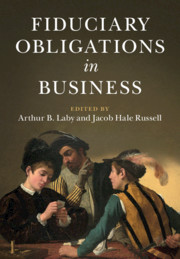Book contents
- Fiduciary Obligations in Business
- Fiduciary Obligations in Business
- Copyright page
- Dedication
- Contents
- Contributors
- Editors’ Acknowledgments
- Introduction The Decline and Rise of Fiduciary Obligations in Business
- Part I Identifying Fiduciaries and Their Duties
- Part II Gaps and Alternatives in Fiduciary Regimes
- 6 Conflicts of Interest in Investment Advice: An Expanded View
- 7 A System of Fiduciary Protections for Mutual Funds
- 8 Equitable Duty: Regulating Corporate Transactions in the Vicinity of Insolvency from a Comparative Perspective
- 9 Equity, Majoritarian Governance, and the Oppression Remedy
- 10 Fiduciary Relationships in Employee Benefit Plans
- Part III Historical and Comparative Perspectives
- Part IV Stakeholders and Society
- Index
8 - Equitable Duty: Regulating Corporate Transactions in the Vicinity of Insolvency from a Comparative Perspective
from Part II - Gaps and Alternatives in Fiduciary Regimes
Published online by Cambridge University Press: 20 August 2021
- Fiduciary Obligations in Business
- Fiduciary Obligations in Business
- Copyright page
- Dedication
- Contents
- Contributors
- Editors’ Acknowledgments
- Introduction The Decline and Rise of Fiduciary Obligations in Business
- Part I Identifying Fiduciaries and Their Duties
- Part II Gaps and Alternatives in Fiduciary Regimes
- 6 Conflicts of Interest in Investment Advice: An Expanded View
- 7 A System of Fiduciary Protections for Mutual Funds
- 8 Equitable Duty: Regulating Corporate Transactions in the Vicinity of Insolvency from a Comparative Perspective
- 9 Equity, Majoritarian Governance, and the Oppression Remedy
- 10 Fiduciary Relationships in Employee Benefit Plans
- Part III Historical and Comparative Perspectives
- Part IV Stakeholders and Society
- Index
Summary
This chapter compares the U.K. and U.S. approaches to fiduciary duty and clawback as they relate to transactions when the firm is in the vicinity of insolvency. Historically the U.S. and the U.K. have balanced directors’ duties and trustee’s avoidance powers in opposite ways. In the U.K., officers and directors have a duty of fairness to creditors in the vicinity of insolvency; in Delaware no such duty to creditors arises. The U.S. takes a strict approach to avoidance of preferential and fraudulent transfers; the U.K. requires culpability. This chapter suggests that, on both sides of the pond, the duty and clawback regimes are under stress due to their failure to appreciate the importance of equitable treatment in the vicinity of insolvency and that the current emphasis on insolvency and pre-insolvency regimes oriented toward “rescue” highlights this shortcoming. The chapter concludes, that both jurisdictions fail to appreciate that duty and clawback serve complementary functions in the vicinity of insolvency—equitable treatment of creditors; and that a more balanced approach would be better than either of the lopsided approaches taken by the U.S. and the U.K.
Keywords
- Type
- Chapter
- Information
- Fiduciary Obligations in Business , pp. 152 - 170Publisher: Cambridge University PressPrint publication year: 2021

